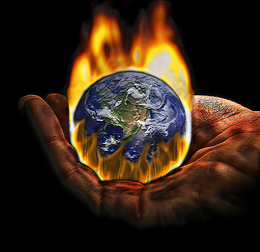
An artist's depiction of global warming, which was a major influence on the world leading up to 2090.
In the year 2090, the world is a different place.
Rapid technologization, evolving geopolitical and political landscapes, extreme weather attributed to climate change, and other events have made the world unrecognizable to people born in the 20th or early 21st centuries.
This is a list of major events from 2000-2089 that have helped create the world as it is ten years before the turn of the century, organized by three different categories.
Political/Social
- Most of the world is beginning to unify politically, with the development of the European, North American, South American and African unions.
- 18 people serve as President of the United States during the 21st century, four of which leave office early due to either assassination, illness or resignation. As of 2090, the current one has served since 2085 and has been reelected. She is slated to serve until 2093.
- Washington DC, Puerto Rico, New York City, Northern Virginia, Cuba, northern Mexico, Baja California, and other areas become US states.
- Scotland, North Ireland, Palestine, Quebec, Greenland and other regions become fully independent and autonomous.
- National boundaries change partly because of World Wars III and IV, which are fought from 2018-2023 and 2057-2060, respectively.
- The deadliest war by number of casualties is World War IV, beating World War III by only four million casualties as World War IV used less nuclear weapons. World War II comes in a close third.
- The United States survives a civil war fought during 2081.
- Terrorism and religious extremism dies out by 2045 due to advancements in security and cybersecurity.
- A major terrorist attack on US government networks in 2017 leads to the creation of The Department of Homeland Cybersecurity.
- US prohibition of recreational drugs and the War on Drugs officially ends in 2037 when the President signs into law the allowance of use of drugs for all purposes.
Environmental
- Global temperatures rise two degrees due to global warming.
- Sea levels rise 23 feet/7 meters, surpassing projections and expectations and drowning many major coastal cities, forcing people inland.
- Natural disasters have increased 45% in quantity and 52% in quality/strength, helping aid the decline in human population. An example of this is Hurricane Harvey from 2077, which stretched from Newfoundland to Cuba and killed nearly three hundred thousand people.
- Many cities sitting on tectonic plates, such as Los Angeles and Tokyo, are erased from the map due to large-scale, nearly supermassive, earthquakes.
- Oil, coal, fossil fuels and other non-renewable sources become extinct by 2060. The world, however, is luckily prepared for this as a transition to solar and hydrogen powered vehicles began thirty some years beforehand.
- West Antarctica and other Antarctic regions become habitable when most of Antarctica's ice melts, causing it to have climates similar to Canada and Scandinavia. Many people flock to West Antarctica and develop major cities such as Crenipol and New Copenhagen.
- 86% of rain forests have been destroyed, and are expected to be fully destroyed within the next century.
- A water shortage has caused class warfare between the upper, middle and lower classes of society, as only the upper and middle classes can afford clean water.
- Due to increased temperatures and the water shortage stated above, people have abandoned extreme climates such as deserts.
- Due to famine and mass dehydration, the population has gone to just over 7.5 billion in 2090.
Scientific/Technological
- Humans first land on Mars in autumn of 2035, and stay there for over five hundred days until Earth is in close enough proximity for them to return.
- Bases, cities and nations have been set up on the Moon and Mars, though most are for either military or scientific purposes.
- Most technologies are either manually controlled by the human mind or are autonomous.
- Artificial intelligence-powered androids hit the market in the 2030s and are eventually sold for slavery, causing an android rebellion in the late 2080s that continues on into 2090. It is expected that androids will be guaranteed the same rights as humans by or after the turn of the century.
- Cars, which are self-driven, can fly no more than ten feet in the air.
- Apple, Microsoft and other major corporations from the late 20th and early 21st centuries remain a powerhouse in technology development, though their power is diminished by other rival companies.
- Scientific understanding of the world has become incomprehensible to observers from previous times.
- Time travel and teleportation are slowing become realities, however, they are not nearly there yet because most scientists are focusing on climate change.
- Space tourism has become one of the largest new industries in the world, but is no more different than vacations in the 20th and early 21st centuries, as touring space takes lots of time, money and planning.
- The human population peaks at 10 billion people during the midpoint of the century, and begins to decline shortly thereafter. In 2090 the population stands and at 7 and a half billion people.
